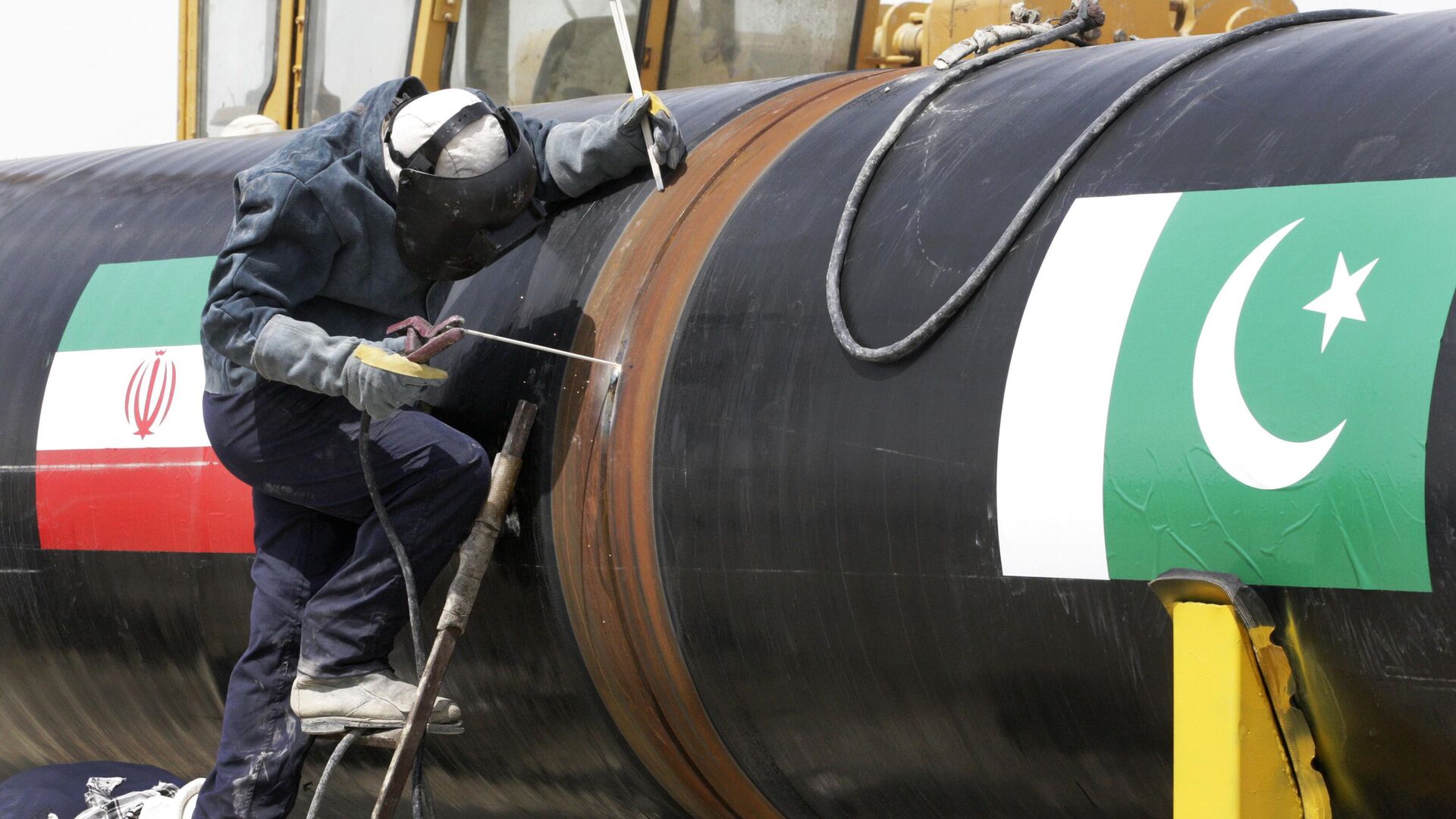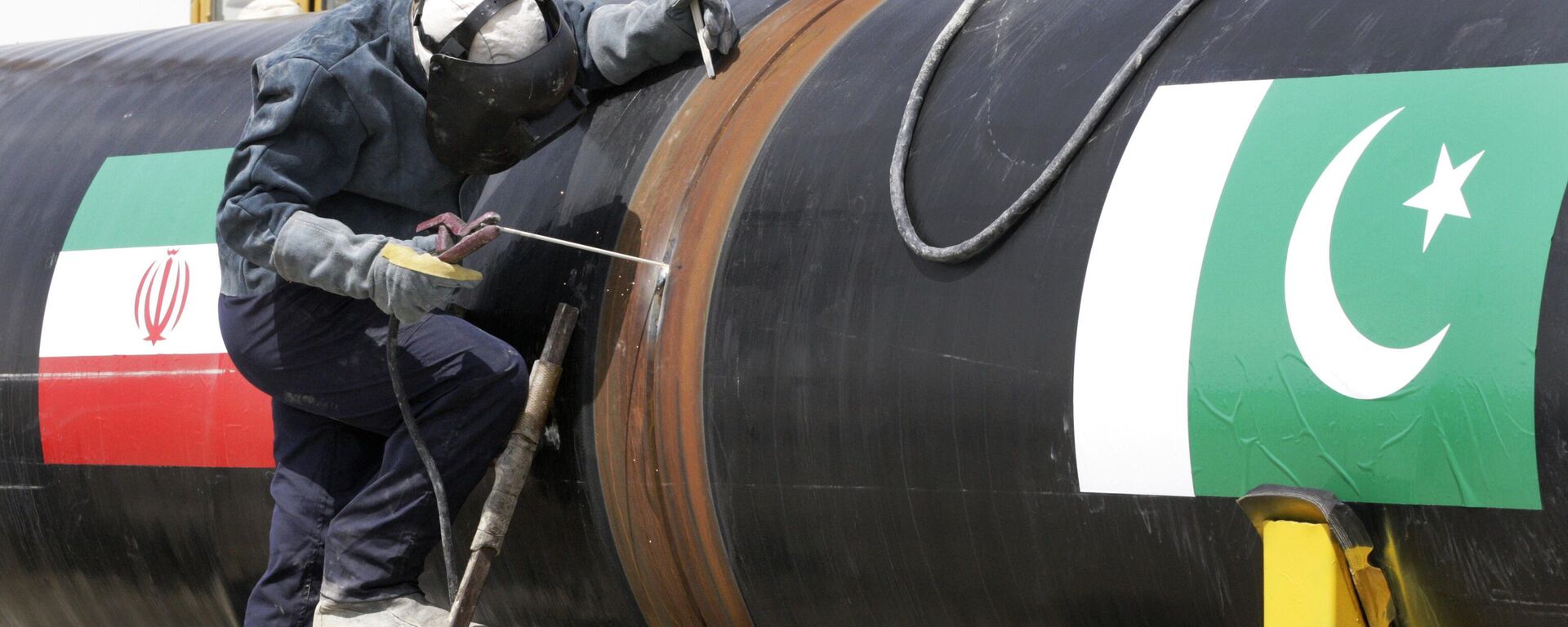https://sputniknews.in/20240508/cant-be-dictated-pakistan-rejects-us-sanctions-threat-over-iran-pak-pipeline-7321473.html
'Can't be Dictated': Pakistan Rejects US Sanctions' Threat Over Iran-Pak Pipeline
'Can't be Dictated': Pakistan Rejects US Sanctions' Threat Over Iran-Pak Pipeline
Sputnik India
Pakistan's Foreign Minister Ishaq Dar has got back at the United States over threatening it with sanctions should Islamabad go ahead with the Pakistan-Iran gas pipeline.
2024-05-08T17:24+0530
2024-05-08T17:24+0530
2024-05-08T17:24+0530
ebrahim raisi
shehbaz sharif
pakistan
iran
islamabad
us state department
western sanctions
sanctions
nuclear weapons
south asia
https://cdn1.img.sputniknews.in/img/07e7/0b/11/5453218_0:160:3072:1888_1920x0_80_0_0_1893ca38932f5fbf6cc5720684191588.jpg
Pakistan's Foreign Minister Ishaq Dar has got back at the United States over threatening it with sanctions should Islamabad go ahead with the Pakistan-Iran gas pipeline.The response by the top Pakistani diplomat comes days after the country's foreign ministry said last month that it was in talks with Washington over its "energy needs".The US State Department renewed its sanction threat over the pipeline project after the visit of Iranian President Ebrahim Raisi to Pakistan last month.“We advise anyone considering business deals with Iran to be aware of the potential risk of sanctions... Ultimately, the Government of Pakistan can speak to their own foreign policy pursuits,” US State Department's Principal Deputy spokesperson Vedant Patel told a regular briefing last month.A joint statement by Raisi and Pakistan's Prime Minister Shehbaz Sharif stressed the importance of energy cooperation between the two neighbours, including developing power transmission lines and the gas pipeline project.The 1,900-kilometre gas pipeline envisions transporting around a billion cubic feet of natural gas per day from Iran's South Pars gas field for 25 years, according to reports.The deal for the project was signed in 2010, but Islamabad requested a 10-year extension in 2014 to construct a 781 kilometre-stretch of the project which lies on its side.Tehran has invested around $2 billion to build the pipeline on its side of the border.Iran reportedly threatened Pakistan with arbitration and penalty clauses if it failed to complete the project by September 2024, which is when the 10-year grace period expires.
https://sputniknews.in/20240425/pakistan-calls-out-us-intervention-says-to-complete-iran-gas-pipeline-project-7216121.html
pakistan
iran
islamabad
south asia
Sputnik India
feedback.hindi@sputniknews.com
+74956456601
MIA „Rossiya Segodnya“
2024
Dhairya Maheshwari
https://cdn1.img.sputniknews.in/img/07e6/0c/13/138962_0:0:641:640_100x100_80_0_0_2cb44360dbcdf6d84bf4b299cd045917.jpg
Dhairya Maheshwari
https://cdn1.img.sputniknews.in/img/07e6/0c/13/138962_0:0:641:640_100x100_80_0_0_2cb44360dbcdf6d84bf4b299cd045917.jpg
News
en_IN
Sputnik India
feedback.hindi@sputniknews.com
+74956456601
MIA „Rossiya Segodnya“
Sputnik India
feedback.hindi@sputniknews.com
+74956456601
MIA „Rossiya Segodnya“
Dhairya Maheshwari
https://cdn1.img.sputniknews.in/img/07e6/0c/13/138962_0:0:641:640_100x100_80_0_0_2cb44360dbcdf6d84bf4b299cd045917.jpg
iran pakistan gas pipeline, us sanctions on iran, jcpoa, iran nuclear deal, raisi pakistan visit, iran pakistan border, iran pakistan fta, iran pakistan trade, pakistan news, pakistan economy, pakistan imf bailout, us sanctions, us hegemony
iran pakistan gas pipeline, us sanctions on iran, jcpoa, iran nuclear deal, raisi pakistan visit, iran pakistan border, iran pakistan fta, iran pakistan trade, pakistan news, pakistan economy, pakistan imf bailout, us sanctions, us hegemony
'Can't be Dictated': Pakistan Rejects US Sanctions' Threat Over Iran-Pak Pipeline
Finalised in 2010, the Iran-Pakistan Gas Pipeline project has remained stalled for years because of US sanctions on Tehran.
Pakistan's Foreign Minister Ishaq Dar has got back at the United States over threatening it with sanctions should Islamabad go ahead with the Pakistan-Iran gas pipeline.
“We have to watch our interests, look at our commitments and the government has to make decisions while keeping Pakistan’s interest in mind about what we will do, when will we do and how will we do what the US or other countries say," Dar, who is also the deputy Prime Minister, told a press briefing in Islamabad on Tuesday.
“It can’t be dictated on us and neither will we allow anyone to use veto. Pakistan is a sovereign country and the way we respect others’ sovereignty, we expect the others to respect Pakistan’s sovereignty,” Dar asserted.
The response by the top Pakistani diplomat comes days after the country's foreign ministry said last month that it was in talks with Washington over its "energy needs".
The US State Department renewed its sanction threat over the pipeline project
after the visit of Iranian President Ebrahim Raisi to Pakistan last month.
“We advise anyone considering business deals with Iran to be aware of the potential risk of sanctions... Ultimately, the Government of Pakistan can speak to their own foreign policy pursuits,” US State Department's Principal Deputy spokesperson Vedant Patel told a regular briefing last month.
A joint statement by Raisi and Pakistan's Prime Minister Shehbaz Sharif
stressed the importance of energy cooperation between the two neighbours, including developing power transmission lines and the gas pipeline project.
The 1,900-kilometre gas pipeline envisions transporting around a billion cubic feet of natural gas per day from Iran's South Pars gas field for 25 years, according to reports.
The deal for the project was signed in 2010, but Islamabad requested a 10-year extension in 2014 to construct a 781 kilometre-stretch of the project which lies on its side.
Tehran has invested around $2 billion to build the pipeline on its side of the border.
Iran reportedly threatened Pakistan with arbitration and penalty clauses if it failed to complete the project by September 2024, which is when the 10-year grace period expires.



